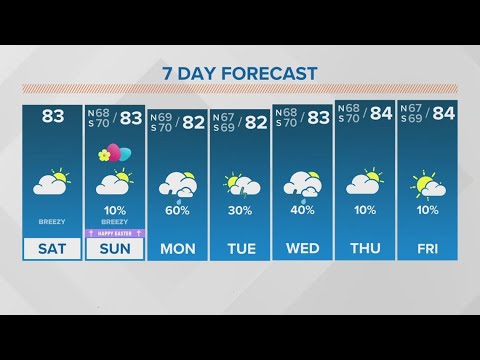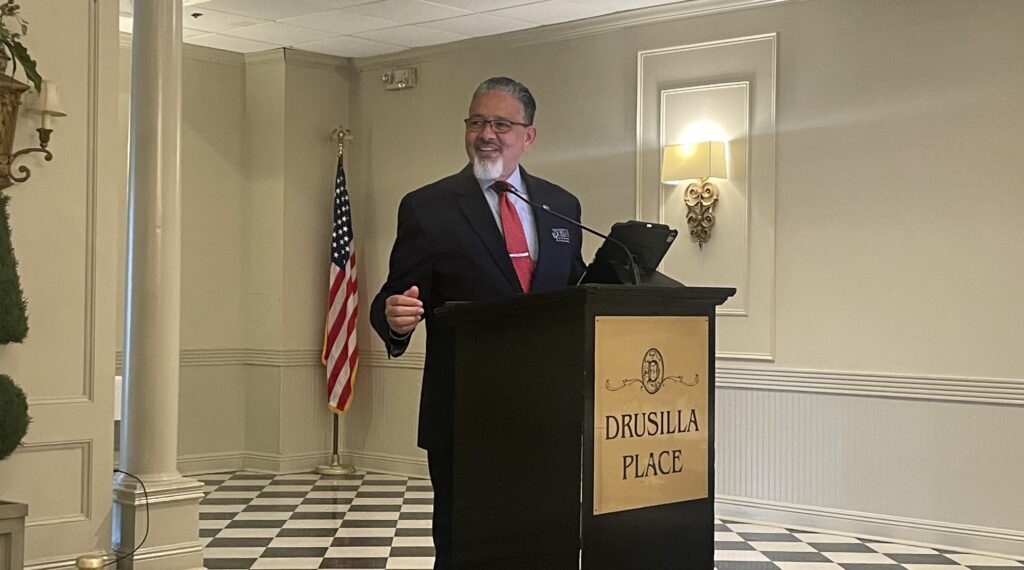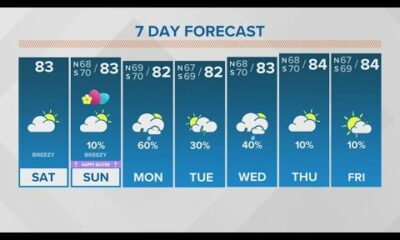News from the South - Louisiana News Feed
Trump withdraws new pipeline rules inspired by CO2 leaks in Mississippi, Louisiana

Trump withdraws new pipeline rules inspired by CO2 leaks in Mississippi, Louisiana
by Tristan Baurick, Verite, Louisiana Illuminator
March 8, 2025
Nearly five years after a pipeline spewed poison gas across a Mississippi town, federal regulators appeared ready in recent weeks to institute new safety rules aimed at preventing similar accidents across the U.S.’s fast-growing network of carbon dioxide (CO2) pipelines.
But the proposed rules, unveiled five days before the end of Joe Biden’s presidency, were quietly derailed during the first weeks of President Donald Trump’s second term.
A federal pipeline safety official not authorized to speak publicly said the proposed rules were “withdrawn” in accordance with a Jan. 20 executive order that freezes all pending regulations and initiates a review process by Trump’s newly appointed agency leaders. Putting the pipeline rules in further doubt is a Feb. 19 executive order aimed at rooting out all regulations that are costly to “private parties” and impede economic development.
Trump’s choice to lead the Pipeline and Hazardous Materials Safety Administration, which proposed the rules, is Paul Roberti, an attorney strongly backed by pipeline and energy industry groups. Roberti, who is awaiting U.S. Senate confirmation, oversaw PHMSA’s safety enforcement during Trump’s first term, a time marked by fewer citations and smaller fines than the Obama and Biden administrations.
GET THE MORNING HEADLINES.
Pipeline safety advocates still hope to push the Trump administration to approve the rules, which they say are critically important for reducing the risks of potentially deadly accidents across a growing number of states.
“It’s not dead yet,” said Paul Blackburn, an energy policy advisor for the Bold Alliance, an environmental group that tracks pipeline development. “It can be brought back by Trump, and I think the Trump administration should be pressured to do that.”
The more than 5,000 miles of CO2 pipelines in the U.S. are primarily used for enhanced oil recovery, a process that injects carbon dioxide into old oil reserves to squeeze out leftover deposits. Much of the current and predicted growth of the CO2 pipeline network is linked to the recent boom in carbon capture technologies, which allow industrial plants to store CO2 underground instead of releasing it into the air.
The CO2 pipeline network could top 66,000 miles – a thirteenfold increase – by 2050, according to a Princeton University-led study.
The Trump administration isn’t as supportive of carbon capture, but industry experts say growth will continue as companies try to meet state-level climate benchmarks.
While proponents say carbon capture will help address climate change, transporting pressurized CO2 comes with dangers, especially for rural stretches of the Midwest and Gulf Coast, where the network is concentrated.
CO2 can cause drowsiness, suffocation and sometimes death. Colorless, odorless, and heavier than air, carbon dioxide can travel undetected and at lethal concentrations over large distances.
The proposed rules would establish the first design, installation and maintenance requirements for CO2 pipelines. Companies operating pipelines would need to provide training to local police and fire departments on how to respond to CO2 leaks, and emergency communication with the public would need to be improved.
Operators would be required to plan for gas releases that could harm people within two miles of a pipeline. The proposed rules show that PHMSA finally recognizes that the threats from CO2 pipelines are different from oil and natural gas pipelines, which can spill, burn or explode, but don’t usually imperil people miles away, said Bill Caram, executive director of the Pipeline Safety Trust, a nonprofit watchdog group.
“These are relatively strong proposals,” he said. “Would these rules make CO2 pipelines completely safe? No. But it would modernize the pipelines.”
PHMSA currently has no specific standards for transporting CO2. Rules governing the CO2 pipeline network haven’t undergone significant review since 1991, according to the trust.
The proposed rules apply “lessons learned” from a 2020 pipeline rupture in Sataria, Miss., PHMSA officials said in an announcement on Jan. 15.
The rupture in the small community 30 miles northwest of Jackson forced about 200 Satartia residents to evacuate. Emergency responders found people passed out, disoriented and struggling to breathe. At least 45 people were treated at nearby hospitals.
“I have learned first-hand from affected communities in Mississippi and across America why we need stronger CO2 pipeline safety standards,” then-PHMSA Deputy Administrator Tristan Brown, a Biden appointee, said in a statement on Jan. 15. “These new requirements will be the strongest, most comprehensive standards for carbon dioxide transportation in the world and will set our nation on a safer path as we continue to address climate challenges.”
Accidental releases have occurred from CO2 pipelines 76 times since 2010, according to PHMSA data reviewed by Verite News. Of the more than 67,000 barrels of CO2 released over the past 15 years, the vast majority – about 54,000 barrels – came from pipelines owned by ExxonMobil subsidiary Denbury Inc.
Denbury operates the 925-mile pipeline network that failed in Satartia and more recently in southwest Louisiana. In April, a pipeline at a Denbury pump station near the Calcasieu Parish town of Sulphur ruptured, triggering road closures and a shelter-in-place advisory. Some residents reported feeling tired and light-headed, but local authorities reported no serious illnesses.
The pump station and pipeline weren’t equipped with alarms or other methods of alerting nearby residents when accidents occur.
Several Sulphur-area residents said they received no notice of the leak or became aware of it via Facebook posts more than an hour after the gas began to spread.
“There should have been alarms, and the whole community should have been notified,” Roishetta Ozane, a community organizer who lives near the station, told Verite in April. “I don’t trust the system we have at all.”
Unless the proposed rules are enacted, similar or worse accidents are likely, said Kenneth Clarkson, the trust’s communications director.
“In the absence of a rule, blatant regulatory shortfalls will remain, leaving the public fully exposed to the risks of CO2 pipelines,” he said.
YOU MAKE OUR WORK POSSIBLE.
This article first appeared on Verite News New Orleans and is republished here under a Creative Commons license. PARSELY = { autotrack: false, onload: function() { PARSELY.beacon.trackPageView({ url: “https://veritenews.org/2025/03/07/trump-carbon-dioxide-pipeline-louisiana/”, urlref: window.location.href }); } }
Louisiana Illuminator is part of States Newsroom, a nonprofit news network supported by grants and a coalition of donors as a 501c(3) public charity. Louisiana Illuminator maintains editorial independence. Contact Editor Greg LaRose for questions: info@lailluminator.com.
The post Trump withdraws new pipeline rules inspired by CO2 leaks in Mississippi, Louisiana appeared first on lailluminator.com
News from the South - Louisiana News Feed
Easter Weekend: Muggy, warm, and windy

SUMMARY: Easter Weekend will be warm, muggy, and breezy, with mostly cloudy skies and temperatures in the low 80s. Current conditions are in the low 70s, making it a sticky day for events like the Crescent City Classic. While there’s a slight chance of rain on Sunday, most of the day will remain dry. Winds from the southeast could gust near 30 mph. Next week, a front will bring increased rain chances and storms starting Monday, with unsettled conditions continuing into Tuesday and Wednesday. Despite this, warm temperatures in the 80s will persist throughout the week.

Easter Weekend looks very nice! It will be hot, humid, and windy with high temperatures in the lower 80s both afternoons. More clouds will be around with some breaks
News from the South - Louisiana News Feed
Vicente Fernandez and Freddy Fender join National Recording Registry

SUMMARY: This year, Vicente Fernandez’s “El Rey” and Freddy Fender’s “Before the Next Teardrop Falls” were inducted into the National Recording Registry, alongside Lin-Manuel Miranda’s *Hamilton* album. Congressman Joaquin Castro has championed the inclusion of more Latino artists in the registry, noting that Latino representation is only 5%. Over the last three years, with input from constituents, Castro has successfully nominated 30 songs and albums, including iconic Latino tracks. He advocates for more Latino contributions to be recognized, including Selena’s work. Castro will continue gathering nominations for 2026, aiming to better reflect Latino cultural influence in the registry.

Each year since 2000, the Library of Congress has selected influential songs and albums to be preserved in the National Recording Registry. This year, three Latino artists were inducted — two of them with deep roots in Latino culture and South Texas.
News from the South - Louisiana News Feed
Q&A with University of Louisiana System President Rick Gallot on higher education

by Piper Hutchinson, Louisiana Illuminator
April 18, 2025
This is an interview with University of Louisiana System President Rick Gallot that took place earlier this month about how the legislative session and federal changes will impact higher education in Louisiana. It has been edited for length and clarity.
You can also listen to a version of this interview on our new podcast The Light Switch.
Piper Hutchinson: What do you think is coming for higher education this session?
Rick Gallot: I think certainly starting with a standstill budget is always better than starting with a proposed cut. So, you know, we’re certainly very grateful for that. I think there’s a lot of uncertainty, coming out of Washington and with the constitutional amendments that did not pass, obviously that has created some angst in terms of what do we do now, right? And so I think there is, again, just an overall level of uncertainty that we’ll see it … kind of play out over time.
I think if you look at the increased revenue from the sales, sales taxes and other things, we’re certainly not in a real bad spot right now as a state in terms of our finances. So I’m still optimistic that we will work through the challenges in the session, and we will come out good on the other side.
Hutchinson: Looking at the bills that we have so far, what do you think is going to be the most impactful for higher education?
Gallot: It’s hard to say, and when you look at what’s filed versus what ultimately makes it through the process; all bills filed on the front end don’t always make it. Rep. (Emily) Chenevert has come back with another diversity, equity and inclusion bill. We will certainly have to see how that plays out. The bill she had last year started one way and ended up another. … Certainly with all other higher ed leaders, she was very receptive to meeting with us and working through some of those challenges last year. At the end of the day, I think the budget is always going to be the main focus that could impact the trajectory going forward.
Hutchinson: There’s one bill that’s going to have a big impact for your system, talking about transferring UNO back to the LSU System. What should we expect on that front?
Gallot: For me personally, it’s a full-circle moment. I was in the house when UNO was transferred from LSU to the University of Louisiana System. You know, I just want what’s best for the students, for the campus community at the University of New Orleans. It is a legislative prerogative. They have the authority to transfer universities from one system to the other. So if this legislation is successful, we will certainly do our part to ensure that it is a seamless transition. We will work with LSU, with Board of Regents and with the legislature to ensure that the transition is as smooth as it could possibly be.
Hutchinson: What’s that like for you [as a former legislator] during the legislative session, being kind of outside the rails?
Gallot: Well, I certainly have a lot of respect for our legislators and the sacrifices they all make in serving. I’m a huge fan of Stephen Covey’s “Seven Habits,” and one of those is: “Seek, first to understand then to be understood.” And so I think that’s helpful to understand the pressures that our legislators are under, knowing that there’s a lot that they have to balance. I think it’s helpful, quite frankly. And I don’t think I burned any bridges while here.
I mean, I did oversee redistricting, so maybe I did [burn] one or two. But for the most part, I still have good relationships with many of my former colleagues … who are still there. I’m grateful to have the opportunity to be a part of the process but from this side.
Hutchinson: There has been a little bit of controversy in the LSU System lately, that’s reignited these conversations about curbing tenure. What are you hearing on that front, and what would that mean for higher education as a whole if they did take an axe to tenure?
Gallot: Going back to COVID, and you think about faculty members, who go through the process of, not only a bachelor’s and a master’s and a terminal degree. You know, they get hired, they’re on a tenure track, they’re researching, they’re writing, they’re building their portfolio, and at the appropriate time they apply for tenure. I think we have to respect that process.
I think it is one that is deeply rooted in higher education, and so I think we certainly have to respect faculty and that they have earned this.
Now, having said that, it’s always one or two bad apples that will spoil the barrel, as they say. I don’t know that simply doing away with tenure is the answer.
If the legislature passes something, then we, as a state system, will certainly abide by whatever changes may be made. I think we want accountability at all levels, that we want our students to be in the best position to learn. We want our faculty to be in the best position to teach, and that our students would graduate and go out and make a difference in society. So we’ll certainly be watching it closely, and hopefully we will see thoughtful debate throughout the process. And again, with whatever the ultimate result is, we will work with it.
Hutchinson: I can’t not talk about what’s going on at the federal level. We’re talking about cutting research funding. There are concerns about immigration and graduate students, and certainly tariffs could increase expenses for higher education. How is the UL System adapting to all of this?
Gallot: Right now there’s so much uncertainty just across the board. Whether it’s the potential loss of research funding and indirect cost, for instance, universities build their budgets based upon what they believe the revenue stream will be from these research grants. I’m hopeful that we will sort of get through this period of uncertainty, and we will see things sort of settle down to be a little more predictable. But you know, at the same time, we will have to adjust if the rules are changed. If the funding formulas are changed, we will just have to adapt. We always have and we always will.
GET THE MORNING HEADLINES.
YOU MAKE OUR WORK POSSIBLE.
Louisiana Illuminator is part of States Newsroom, a nonprofit news network supported by grants and a coalition of donors as a 501c(3) public charity. Louisiana Illuminator maintains editorial independence. Contact Editor Greg LaRose for questions: info@lailluminator.com.
The post Q&A with University of Louisiana System President Rick Gallot on higher education appeared first on lailluminator.com
-

 Mississippi Today6 days ago
Mississippi Today6 days agoLawmakers used to fail passing a budget over policy disagreement. This year, they failed over childish bickering.
-

 Mississippi Today6 days ago
Mississippi Today6 days agoOn this day in 1873, La. courthouse scene of racial carnage
-

 Local News6 days ago
Local News6 days agoSouthern Miss Professor Inducted into U.S. Hydrographer Hall of Fame
-

 News from the South - Alabama News Feed5 days ago
News from the South - Alabama News Feed5 days agoFoley man wins Race to the Finish as Kyle Larson gets first win of 2025 Xfinity Series at Bristol
-

 News from the South - Alabama News Feed5 days ago
News from the South - Alabama News Feed5 days agoFederal appeals court upholds ruling against Alabama panhandling laws
-

 News from the South - Florida News Feed7 days ago
News from the South - Florida News Feed7 days agoSevere weather has come and gone for Central Florida, but the rain went with it
-

 News from the South - Florida News Feed6 days ago
News from the South - Florida News Feed6 days agoJacksonville University only school with 2 finalist teams in NASA’s 2025 Human Lander Challenge
-

 News from the South - Alabama News Feed7 days ago
News from the South - Alabama News Feed7 days agoBellingrath Gardens previews its first Chinese Lantern Festival








































